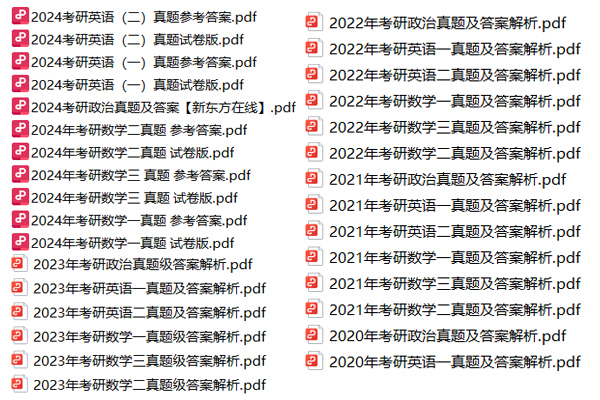【钜惠】25考研
红包
【专业课】热门类HOT
25考研
【MBA】在职考研
【择校】择专业
计划
【大纲】电子资料
计划
【25考研】全科学
预备
【在职】择校分析
25考研
【测评】英语|政治
免费
【报录比】查询
免费学
【备考】研友群
精

扫码加入训练营
牢记核心词
学习得礼盒
考研英语要想得分,阅读理解一定不能落下!考研备考前期是一个夯实基础的时机,同学们相对花在词汇和语法上的时间会比较多。到了准备考试的中期阶段,在基础上大家还需要针对具体的题型掌握相应的解题技巧并进行大量练习。下面是新东方在线考研频道为大家整理的“2022考研英语阅读:典型语法句型(1)”,一起来看看吧!
一 省略
No disciplines have seized on professionalism with as much enthusiasm as the humanities.
该句省略了谓语部分“have seized on...”,谓语动词省略是英语句子成分省略的常见形式,考生应能够识别省略成分并习惯此类句型。再如:
So disciplines acquire a monopoly not just over the production of knowledge, but also over the production of the producers of knowledge.
此句中,谓语部分“acquire a monopoly”在后半句中同样被省略掉,因前后谓语部分所表达的意思相同。
此外,当前后主语一致时,不但谓语部分可以省略,主语部分也可以适当省略,如:
22% of American college graduates now major in business compared with only 2% in history and 4% in English.
该句中, “American college graduates”在2%与4%之后不再出现。
伴随句也是较为典型的省略主语的句型,省略的原因同样是前后主语一致,如:
Otherwise, academics will continue to think dangerously alike, increasingly detached from the societies which they study, investigate and criticize.”
二 同位语从句:
(一)同位语从句的引导词
引导同位语从句的词语通常有连词that,whether,连接代词和连接副词等。
1. 由that引导
We heard the news that our team had won. 我们听到消息说我们队赢了。
They were worried over the fact that you were sick. 他们为你生病发愁。
The news that we are having a holiday tomorrow is not true. 明天放假的消息不实。
I’ve come to the conclusion that it was unwise to do that. 我得出结论这样做是不明智的。
The fact that the money has gone does not mean it was stolen. 那笔钱不见了这一事实并不意味着是被偷了。
He referred to Copernicus’ statement that the earth moves round the sun. 他提到了哥白尼关于地球绕太阳转的说法。
注意1:在某些名词(如demand, wish, suggestion, resolution等)后面的同位语从句要用虚拟语气。如:
They were faced with the demand that this tax be abolished. 他们面对废除这个税的要求。
They expressed the wish that she accept the award. 他们表示希望她接受这笔奖金。
There was a suggestion that Brown should be dropped from the team. 有一项建议是布朗应该离队。
The suggestion that the new rule be adopted came from the chairman. 采纳新规则的建议是主席提出的。
The resolution that women be allowed to join the society was carried. 允许妇女参加这个协会的决议通过了。
I can understand their eagerness that you should be the main speaker. 我理解他们希望你作主要发言人的殷切心情。
注意2:引导同位语从句的连词that通常不省略,但在非正式文体中也可以省去。如:
He gabbed his suitcase and gave the impression he was boarding the Tokyo plane. 他拿起了手提箱,给人的印象是他要登上飞往东京的飞机了。
2. 由whether引导
There is some doubt whether he will come. 他是否会来还不一定。
Answer my question whether you are coming. 你回答我的问题:你来不来。
The question whether it is right or wrong depends on the result. 这个是对还是错要看结果。
We are not investigating the question whether he is trustworthy. 我们不是在调查他是否可以信任的问题。
注意:whether 可引导同位语从句,但if不能引导同位语从句。
3. 由连接代词引导
Have you any idea what time it starts? 你知道什么时候开始吗?
From 1985-90 I was an instructor at the regional party headquarters. After that I went back to work in a factory. Then I had no idea what a casino was. 从1985年到1990年我是地方党部的教员。随后我回到一家工厂工作。当时我不知道赌场是什么样的地方。
4. 由连接副词引导
I have no idea when he will come back. 我不知道他什么时候回来。
It is a question how he did it. 那是一个他如何做的问题。
He had no idea why she left. 他不知道她为什么离开。
You have no idea how worried I was! 你不知道我多着急!
(二)关于分离同位语从句
有时同位语从句可以和同位的名词分开。如:
The story goes that he beats his wife. 传说他打老婆。
The news got about that he had won a car in the lottery. 消息传开说他中彩得了一辆汽车。
The rumor spread that a new school would be built here. 谣传这里要盖一所新学校。
Report has it that the Smiths are leaving town. 有传言说史密斯一家要离开这座城市。
The thought came to him that maybe the enemy had fled the city. 他想到可能敌人已逃离这座城市。
The order soon came that all citizens should evacuate the village. 不久命令下来,所有居民都必须撤出村子。(G31)
(三)同位语从句与定语从句的区别
1.意义的不同
同位语从句是用于说明所修饰名词的具体内容的,它与被修饰词语通常可以划等号而定语从句是限制所修饰名词的,它的作用是将所修饰的名词与其他类似的东西区别开来:
We are glad at the news that he will come. 听到他要来这个消息我们很高兴。(news的内容就是that he will come,故that引导的是同位语从句)
We are glad at the news that he told us. 听到他告诉我们的这个消息我们很高兴。(that从句是限制the news的内容的,即我们高兴只是因为他告诉的这个news而不是其他的news,故that从句为定语从句)
2. 引导词的不同
what, how, if, whatever 等可引导名词性从句,但不引导定语从句。
3. 引导词的功能上的不同
that引导同位语从句时,它不充当句子成分,而引导定语从句时,它作为关系代词,要么充当定语从句的主语,要么充当定语从句的宾语。如上例 that he told us中的that就充当told的宾语。
4. 被修饰词语的区别
同位语从句所修饰的名词比较有限,通常有hope, wish, idea, news, fact, promise, opinion, suggestion, truth等,而定语从句所修饰的名词则非常广泛。 另外,when和where 引导定语从句时,通常只修饰表示时间和地点的名词,而它们引导同位语从句时却不一定又如why引导定语从句,它通常只修饰名词the reason,而它引导同位语从句时则不一定:
I have no idea when they will come . 我不知道他们什么时候来。(同位语从句)
I’ll never forget the days when I lived there.. 我永远不会忘记我住在那儿的日子。(定语从句)(from www.hxen.com)
We don’t understand the problem why this is the best choice. 我们不明白这个问题,为什么这是好的选择。(同位语从句 )
The reason why he didn’t come to the meeting is that he is ill. 他未能来开会,原因是他生病了。(定语从句)
以上为新东方在线考研频道小编整理的"2022考研英语阅读:典型语法句型(1)"的相关内容,预祝大家都能考上理想的学校!更多相关内容尽在新东方在线考研英语频道!
本文关键字: 考研英语阅读理解

 资料下载
资料下载
新东方考研资料下载地址
发布时间:2023-05-17新东方在线考研资料合集
下载方式:微信扫码,获取网盘链接

目录:
1.2013-2023年近10年政数英真题及解析PDF版(新东方)
2.2013-2023年专业课考试历年真题及解析PDF版
3.24考研复习备考资料大合集:大纲+备考资料+词汇书+考前押题+自命题
资料介绍:
1.2013-2023年近10年政数英真题及解析PDF版(新东方)
 、
、
2.2013-2023年专业课考试历年真题及解析PDF版


3.24考研复习备考资料大合集

3.24考研复习备考资料:考研大纲

3.24考研复习备考资料:政数英备考资料+自命题真题

------------------
考研备考过程中,尤其是专业课部分,参考往年的考试真题,对于我们的复习有更好的帮助。北京大学考研真题资料都有哪些?小编为大家进行了汇总。
北京大学考研真题资料-公共课

北京大学考研真题资料-专业课


以上就是关于“北京大学考研真题资料下载(历年汇总)”的整理,更多考研资料下载,请关注微信获取下载地址。
2024考研公共课必背知识点汇总
发布时间:2023-01-03扫码添加【考研班主任】
即可领取资料包
2013-2023考研历年真题汇总
发布时间:2023-01-03扫码添加【考研班主任】
即可领取资料包
考研英语大纲词汇(PDF可打印)
发布时间:2023-01-03扫码添加【考研班主任】
即可领取资料包
2024考研专业课知识点总结
发布时间:2023-01-03扫码添加【考研班主任】
即可领取资料包
2023考研政治 内部押题 PDF
发布时间:2022-11-16扫码添加【考研班主任】
即可领取资料包
徐涛:23考研预测六套卷
发布时间:2022-11-16扫码添加【考研班主任】
即可领取资料包
考研政数英冲刺资料最新整理
发布时间:2022-11-16扫码添加【考研班主任】
即可领取资料包
23考研答题卡模板打印版
发布时间:2022-11-16扫码添加【考研班主任】
即可领取资料包
2023考研大纲词汇5500PDF电子版
发布时间:2022-07-28扫码添加【考研班主任】
即可领取资料包
考研历年真题(公共课+专业课)
发布时间:2022-07-28扫码添加【考研班主任】
即可领取资料包
考研英语阅读100篇附解析及答案
发布时间:2022-01-07扫码添加【考研班主任】
即可领取资料包
新东方考研学霸笔记整理(打印版)
发布时间:2022-01-07扫码添加【考研班主任】
即可领取资料包
2001-2021年考研英语真题答案(可打印版)
发布时间:2022-01-07扫码添加【考研班主任】
即可领取资料包
考研英语词汇5500(完整版下载)
发布时间:2022-01-07扫码添加【考研班主任】
即可领取资料包
2022考研政审表模板精选10套
发布时间:2022-01-07扫码添加【考研班主任】
即可领取资料包
历年考研真题及答案 下载
发布时间:2021-12-09扫码添加【考研班主任】
即可领取资料包
考研政审表模板汇总
发布时间:2020-06-17扫码添加【考研班主任】
即可领取资料包
近5年考研英语真题汇总
发布时间:2020-06-17扫码添加【考研班主任】
即可领取资料包
考研英语大纲词汇5500
发布时间:2020-06-17扫码添加【考研班主任】
即可领取资料包
2022考研12大学科专业排名汇总
发布时间:2019-11-21扫码添加【考研班主任】
即可领取资料包
2023考研政治复习备考资料【珍藏版】
发布时间:2019-11-21扫码添加【考研班主任】
即可领取资料包
考研英语万能模板+必备词汇+范文
发布时间:2019-11-21扫码添加【考研班主任】
即可领取资料包
考研数学一、二、三历年真题整理
发布时间:2019-11-21扫码添加【考研班主任】
即可领取资料包
2001-2021历年考研英语真题PDF版
发布时间:2019-11-21扫码添加【考研班主任】
即可领取资料包
近10年考研政治真题答案及解析
发布时间:2019-11-21扫码添加【考研班主任】
即可领取资料包

添加班主任领资料
添加考研班主任
免费领取考研历年真题等复习干货资料

 推荐阅读
推荐阅读
为了让考研的同学更高效地复习考研英语,新东方在线考研频道整理了2025考研英语阅读理解复习总结段落的固有模式,考研的同学可以了解一下,希望对大家有所帮助。
为了让考研的同学更高效地复习考研英语,新东方在线考研频道整理了2025考研英语阅读理解复习宏观阅读的方法,考研的同学可以了解一下,希望对大家有所帮助。
为了让考研的同学更高效地复习考研英语,新东方在线考研频道整理了2025考研英语阅读理解复习微观阅读的技巧,考研的同学可以了解一下,希望对大家有所帮助。
为了让考研的同学更高效地复习考研英语,新东方在线考研频道整理了2025考研英语阅读理解复习标点符号的作用,考研的同学可以了解一下,希望对大家有所帮助。
为了让考研的同学更高效地复习考研英语,新东方在线考研频道整理了2025考研英语阅读理解词汇题破解关键:上下文,考研的同学可以了解一下,希望对大家有所帮助。

 资料下载
资料下载
新东方在线考研资料合集
下载方式:微信扫码,获取网盘链接

目录:
1.2013-2023年近10年政数英真题及解析PDF版(新东方)
2.2013-2023年专业课考试历年真题及解析PDF版
3.24考研复习备考资料大合集:大纲+备考资料+词汇书+考前押题+自命题
资料介绍:
1.2013-2023年近10年政数英真题及解析PDF版(新东方)
 、
、
2.2013-2023年专业课考试历年真题及解析PDF版


3.24考研复习备考资料大合集

3.24考研复习备考资料:考研大纲

3.24考研复习备考资料:政数英备考资料+自命题真题

------------------
考研备考过程中,尤其是专业课部分,参考往年的考试真题,对于我们的复习有更好的帮助。北京大学考研真题资料都有哪些?小编为大家进行了汇总。
北京大学考研真题资料-公共课

北京大学考研真题资料-专业课


以上就是关于“北京大学考研真题资料下载(历年汇总)”的整理,更多考研资料下载,请关注微信获取下载地址。
扫码添加【考研班主任】
即可领取资料包
扫码添加【考研班主任】
即可领取资料包
扫码添加【考研班主任】
即可领取资料包
扫码添加【考研班主任】
即可领取资料包
扫码添加【考研班主任】
即可领取资料包
扫码添加【考研班主任】
即可领取资料包
扫码添加【考研班主任】
即可领取资料包
扫码添加【考研班主任】
即可领取资料包
扫码添加【考研班主任】
即可领取资料包
扫码添加【考研班主任】
即可领取资料包
扫码添加【考研班主任】
即可领取资料包
扫码添加【考研班主任】
即可领取资料包
扫码添加【考研班主任】
即可领取资料包
扫码添加【考研班主任】
即可领取资料包
扫码添加【考研班主任】
即可领取资料包
扫码添加【考研班主任】
即可领取资料包
扫码添加【考研班主任】
即可领取资料包
扫码添加【考研班主任】
即可领取资料包
扫码添加【考研班主任】
即可领取资料包
扫码添加【考研班主任】
即可领取资料包
扫码添加【考研班主任】
即可领取资料包
扫码添加【考研班主任】
即可领取资料包
扫码添加【考研班主任】
即可领取资料包
扫码添加【考研班主任】
即可领取资料包
扫码添加【考研班主任】
即可领取资料包

 阅读排行榜
阅读排行榜
 相关内容
相关内容